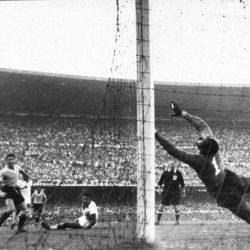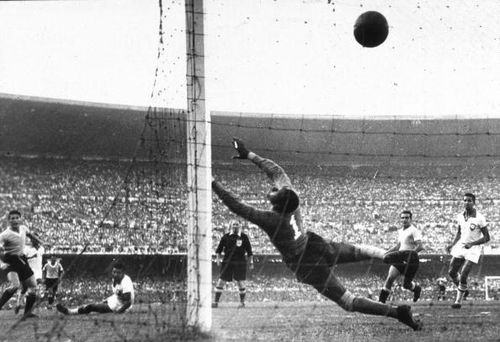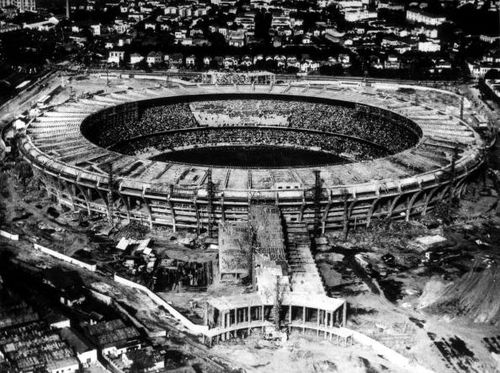
Iconic World Cup Moments: When Uruguay silenced the Maracana
“Down through its history, only three people have managed to silence the Maracana – the Pope, Frank Sinatra and me.”
Not many quotes resonate through the ages. Some end up as footnotes in various publications while others are discarded from memory without a second thought. But these words by Uruguay winger Alcides Ghiggia will forever live through football history after he scored the biggest and one of the most defining goals in the history of the sport.

Uruguay’s Ghiggia (L) scores the winning goal past the dive of Brazilian goalkeeper Barbosa to win the World Cup for Uruguay and complete a major by upset by beating hosts and favourites Brazil.
It was a game to remember for the ages. And a game to forget for the Brazilians. Sadly, in spite of the five trophies they went on to win later, the Brazil vs Uruguay match in the 1950 World Cup will forever cast a dark shadow over their legacy. And nothing will ever act as consolation for the fact that the mighty Brazilians were humbled in front of a tightly packed and vociferous Maracana filled with more than 200,000 fans – a world record for any sporting event.
Prelude
The format of the 1950 World Cup wasn’t the kind we are used to seeing today. It did have a group stage, but the final four teams played in a round-robin format with each team playing the other three and the team with the most points taking home the Jules Rimet trophy.
FIFA did not change the format in spite of teams like Scotland and India pulling out of the tournament and went ahead with the same format. Replacement teams like France also declined to commit due to the amount of travel involved. And so the tournament went on in spite of the ridiculously asymmetrical group stage format. While some teams needed to play three games to qualify, Uruguay and Bolivia needed to play only one (Uruguay thrashed them 8-0).
Eventually, the four teams that qualified from the respective groups were Brazil, Uruguay, Spain and Sweden. In the round-robin, Brazil continued their imperious form and handed out embarrassing 7-1 and 6-1 defeats to Sweden and Spain respectively. Uruguay on the other hand were held to a 2-2 draw by Spain and needed a late winner to beat Sweden 3-2.
In a twist of fate, the final round-robin match between Brazil and Uruguay eventually became the title decider. Brazil, a point ahead of Uruguay, had to ensure that they did not lose the game to win their first World Cup. Uruguay, however, needed a win to lift the trophy for the second time after the inaugural World Cup in 1930.
Buildup to “the final”
Brazil, playing at home, were undoubtedly the favorites to lift the coveted trophy. The stage had been set at the Copa America the previous year, where Brazil had won by scoring an astounding 46 goals in just eight matches. Ecuador had felt their wrath when they were beaten 9-1, Bolivia had been decimated 10-1 while even runners-up Paraguay were not spared and were beaten 7-0. Not to mention, Brazil also beat Uruguay 5-1!
But this was the World Cup, and Uruguay still considered this to be their domain. They had won the first edition in 1930 and had declined to participate in 1934 and 1938 due to political ramifications at the time. With the Second World War coming in the way in the 1940s, Uruguay had waited 20 years to “defend their trophy”. They were still undefeated at World Cups and it was their turf; albeit not literally.
The confident Brazilian people were already celebrating their team’s victory even before the final game. A victory song was composed, practised and ready to be played after the final. 22 gold medals were made with each player’s name imprinted on them. Even the mayor of Rio got into the act and delivered a speech with the words “You, players, who in less than a few hours will be hailed as champions by millions of compatriots! You, who have no rivals in the entire hemisphere! You, who will overcome any other competitor! You, who I already salute as victors!”
The radio and the press were not ones to be cautious either. On the day of the final, the morning edition of a Rio newspaper O Mundo carried the Brazilian team photograph with the words: “These are the world champions”. Uruguay captain Obdulio Varela, disgusted with the headline, grabbed as many newspapers he could and persuaded his entire team to urinate on them.

Aerial view of the gigantic Maracana Stadium still under construction for the 1950 World Cup finals
“Let’s start the show”
Official records state that there were 199,854 at the stadium. The official numbers were off by approximately 10,000. There were close to 210,000 people packed into the newly built Maracana – Brazil’s pride and joy (that is almost three times the number of people who will fit inside the renovated Maracana today). The Maracana reverberated and bounced with the tens of thousands of people inside the stadium, almost breathing as one, repeatedly chanting “Brasil! Brasil!”
Uruguay were definitely the underdogs – and the Maracana crowd made sure they knew it. A hostile reception awaited the team as they prepared to go out on to the pitch. Varela, one of Uruguay’s most experienced campaigners calmed his team down: “Walk out there calmly and don’t look up. The game is played on the pitch, so never look at the stands.”
Varela even defied his manager’s orders to play a defensive game against the Brazilians. He pointed out Brazil’s victories over Spain and Sweden and implored his team in a poignant speech to not sit back against the Brazilians, ending with the words: “Boys, outsiders don’t play. Let’s start the show.”